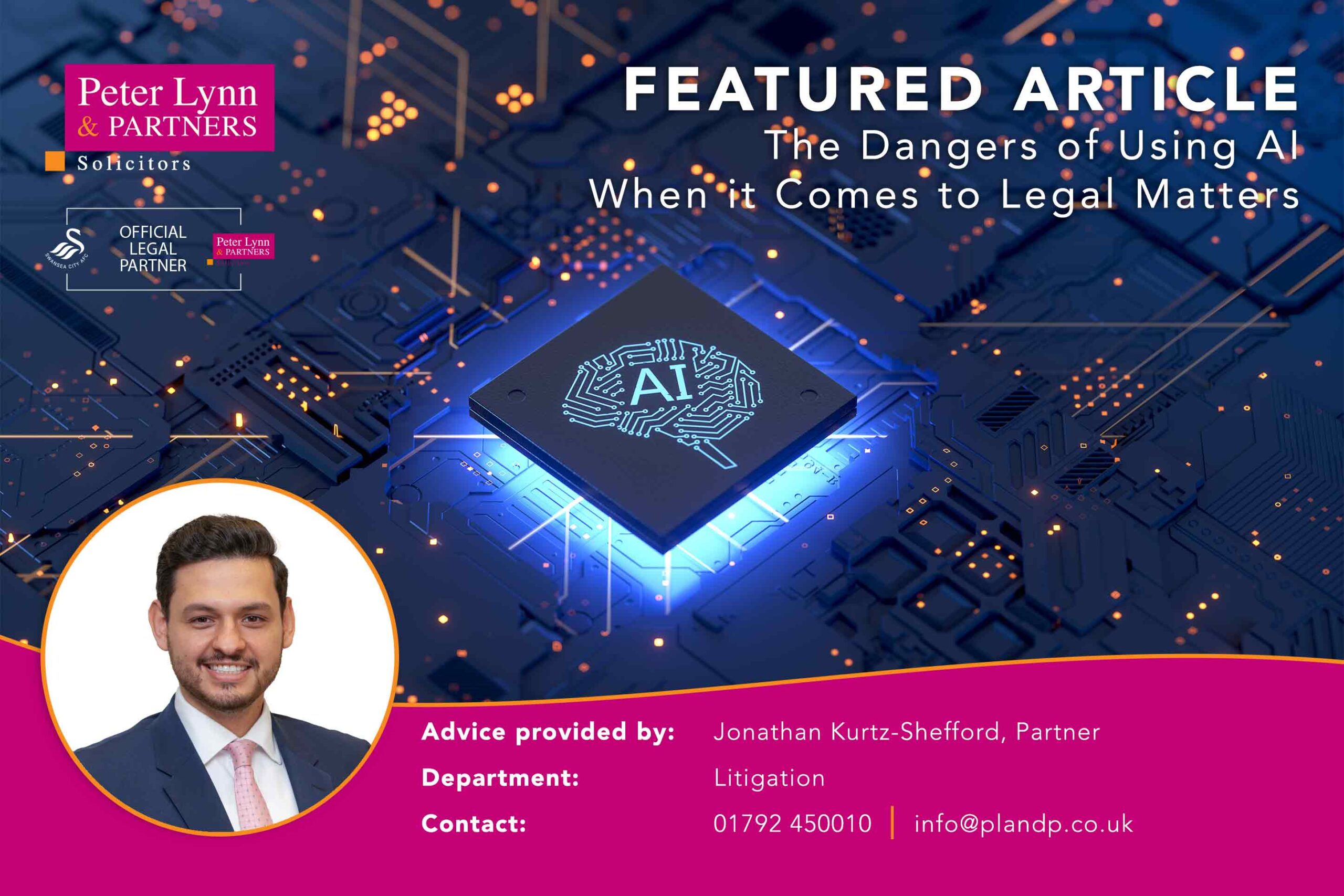The Dangers of Using AI When it Comes to Legal Matters

Artificial Intelligence (AI) has made significant strides in a range of sectors including healthcare, finance, and entertainment. The legal sector has also seen its fair share of AI adoption, with tools designed to analyse documents, assess statistical data and much more.
However, despite the enticing efficiency and cost savings, the dangers of relying solely on AI for legal matters cannot be ignored. It is crucial to understand the importance of human oversight, particularly when dealing with:
Terms & Conditions of Business
Terms & Conditions (T&Cs) are the lifeblood of any business. These legal documents outline the rules and guidelines for customers and suppliers, and while AI tools can help draft T&Cs, they can miss the nuances that humans can discern.
For example, AI may not be able to fully grasp the ever-changing regulatory landscape, the risks associated with the product or service, and more. A human legal expert, conversant with current laws, can ensure the T&Cs are not only legally sound but also tailored to the specific needs of the business.
Shareholder & Partnership Agreements
When it comes to shareholder and partnership agreements, the stakes are even higher. These agreements form the foundation of how the business is run, how profits and losses are shared and how people exit the business.
Here, understanding the subtleties of human relationships and long-term goals is critical. AI lacks the ability to gauge intentions, emotions, or personal goals, which are often integral to these agreements. A skilled lawyer can negotiate and draw up these documents with the foresight and adaptability needed for the evolving nature of business relationships.
Commercial Property Leases
Commercial property leases can often involve large sums of money and long-term commitments. While AI can analyse and draft initial contracts quickly, it may not take into consideration the complexities of property laws, devolved legislation, local authority requirements, or unique lease conditions.
Furthermore, AI systems are only as good as the data they are trained on. If they have not been exposed to a particular situation, they may fail to address critical components. On the other hand, experienced lawyers possess a wealth of knowledge and practical wisdom that AI simply cannot replicate.
Wills
Arguably, no legal document is more personal than a Will. It encompasses the final wishes of an individual regarding their assets and loved ones. Using AI to draft a Will might be efficient, but it misses the emotional and personal elements that are so crucial in this process. A solicitor will not only ensure the legality of the Will but can also provide tailored advice and tax-efficient inheritance planning.
Litigation
AI can play a significant role in litigation by assisting in tasks such as e-discovery, where enormous volumes of data are analysed to find relevant information for legal cases. The speed and efficiency of AI in searching through documents, emails, and other data are invaluable.
However, litigation is not just a matter of data processing. It requires a nuanced understanding of laws, court procedures, and the human aspects of the case. This is where AI falls short. For instance, courtroom arguments and strategies require a legal expert to gauge the demeanour of judges and opposing counsel, and to craft arguments that appeal not only to the law but also to human emotion and reason.
Case in Point
A LiP (litigant in person) tried to present fictitious submissions in court based on answers provided by the ChatGPT chatbot.
The civil case, heard in Manchester, involved one represented party and one unrepresented. Proceedings ended for the day with the barrister for one side arguing there was no precedent for the case being advanced.
The following day, the LiP returned to court with four case citations, each backing the point they were trying to make.
On closer inspection by the barrister, it transpired that one case name had simply been fabricated, while the other three were real case names but with the relevant cited passages being completely different to the judgment in each. For all four citations, the paragraphs quoted were completely fictitious, though appearing completely legitimate.
The judge quizzed the litigant in person, who admitted they had asked the AI tool ChatGPT to find cases that could prove their argument.
The chatbot appears then to have delved into a bank of case names and created excerpts purportedly from these cases which responded to the question asked of it.
The case highlights the potential influence of AI in court proceedings, particularly when one or both parties are unrepresented.
Summary
AI has the power to greatly enhance the legal process with its speed and data processing capabilities. However, the human touch remains indispensable when dealing with sensitive and complex legal matters.
Legal experts bring to the table not just knowledge, but also empathy, adaptability, and an understanding of the broader context that AI can’t match.
Conclusion.
While using AI may appear the fastest (and perceptually much cheaper) way to deal with legal matters, you are leaving yourself open to significant (and potentially expensive) risk without using a trained solicitor.
Legal documents are there to protect you, your loved ones and your business interests and ultimately, prevent legal problems.
So don’t leave it until you need the legal protection they provide to realise the AI version is worthless.
Prevent legal problems by arranging a meeting with our Company & Commercial lawyers today by contacting:
01792 450010